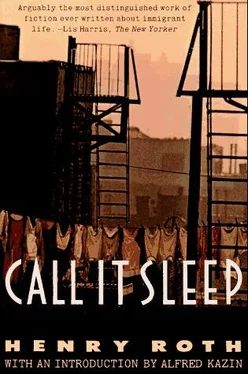Henry Roth - Call It Sleep
Здесь есть возможность читать онлайн «Henry Roth - Call It Sleep» весь текст электронной книги совершенно бесплатно (целиком полную версию без сокращений). В некоторых случаях можно слушать аудио, скачать через торрент в формате fb2 и присутствует краткое содержание. Год выпуска: 1992, Издательство: Farrar, Straus and Giroux, Жанр: Классическая проза, на английском языке. Описание произведения, (предисловие) а так же отзывы посетителей доступны на портале библиотеки ЛибКат.
- Название:Call It Sleep
- Автор:
- Издательство:Farrar, Straus and Giroux
- Жанр:
- Год:1992
- ISBN:нет данных
- Рейтинг книги:4 / 5. Голосов: 1
-
Избранное:Добавить в избранное
- Отзывы:
-
Ваша оценка:
- 80
- 1
- 2
- 3
- 4
- 5
Call It Sleep: краткое содержание, описание и аннотация
Предлагаем к чтению аннотацию, описание, краткое содержание или предисловие (зависит от того, что написал сам автор книги «Call It Sleep»). Если вы не нашли необходимую информацию о книге — напишите в комментариях, мы постараемся отыскать её.
, his first novel, in 1934, it was greeted with critical acclaim. But in that dark Depression year, books were hard to sell, and the novel quickly dropped out of sight, as did its twenty-eight-year-old author. Only with its paperback publication in 1964 did the novel receive the recognition it deserves.
was the first paperback ever to be reviewed on the front page of
, and it proceeded to sell millions of copies both in the United States and around the world.
Call It Sleep
Call It Sleep — читать онлайн бесплатно полную книгу (весь текст) целиком
Ниже представлен текст книги, разбитый по страницам. Система сохранения места последней прочитанной страницы, позволяет с удобством читать онлайн бесплатно книгу «Call It Sleep», без необходимости каждый раз заново искать на чём Вы остановились. Поставьте закладку, и сможете в любой момент перейти на страницу, на которой закончили чтение.
Интервал:
Закладка:
“Here’s all I c’n find, Mr. Lobe. His towel, and his shoit an’ a jacket.”
“All right, Joe,” Mr. Lobe took the package from him and turned to David. “Here you are, my boy. Put it under your arm and don’t lose it.” He tucked it under David’s arm. “Not heavy, is it? No? That’s good.” He opened the door to let David pass. “Good bye.” A dry smile whisked over his features. “Pretty tough for you.”
Grasping the bundle firmly under his arm, David went slowly down the stairs. So that was how his father quit a place! He held a hammer in hand, he would have killed somebody. David could almost see him, the hammer raised over his head, his face contorted in terrific wrath, the rest cringing away. He shuddered at the image in his mind, stopped motionless on the stair, terrified at having to confront the reality. But he must go down; he must meet him; it would be worse for him if he remained on the stair any longer. He didn’t want to go, but he had to. If only the stairs were twice as high.
He hurried down, came out into the street. His father, his back pressed close to the iron wicket, was waiting for him, and when he saw him come out, motioned to him to hurry and began walking away. David ran after him, caught up to him finally, and his father, without slackening his pace, relieved him of the bundle.
“They took long enough,” he said, casting a malevolent glance over his shoulder. It was evident from his face that he had worked himself into a rage during the interval that David had left him. “They gave you the money?”
“Yes, Papa.”
“How much?”
“Six — six dollars, the girl—”
“Did they say anything to you?” His teeth clenched grimly, “About me?”
“No, Papa,” he answered hurriedly. “Nothing, Papa. They just gave me the — the money and I went down.”
“Where is it?”
“Over here,” he pointed to the pocket.
“Well, give it to me!”
With difficulty, David uprooted the envelope from his pocket. His father snatched it from him, counted the money.
“And so they said nothing, eh?” He seemed to demand a final confirmation. “None of the men spoke to you, did they? Only that bald-headed pig with the glasses?” He was watching him narrowly.
“No, Papa. Only that man. He just gave me the money.” He knew that while his father’s eyes rested on him he must look frank, he must look wide-eyed, simple.
“Very well!” His lips stretched for a brief instant in fleeting satisfaction. “Good!”
They stopped at the corner and waited for the trolley …
* * *
David never said anything to anyone of what he had discovered, not even to his mother — it was all too terrifying, too unreal to share with someone else. He brooded about it till it entered his sleep, till he no longer could tell where his father was flesh and where dream. Who would believe him if he said, I saw my father lift a hammer; he was standing on a high roof of darkness, and below him were faces uplifted, so many, they stretched like white cobbles to the end of the world; who would believe him? He dared not.
III
THE table had been set with the best dishes. There was a chicken roasting in the oven. His mother was pouring the last of the Passover’s lustrous red wine from the wicker-covered bottle into the fat flagon. She had been quiet till now, but as she set the bottle down in the center of the table, she turned to David who was watching her. “I feel something I don’t know what,” she said. “Troubled.” She looked at the floor a moment, gazing mournfully at nothing; then turned up her palm as if asking herself, “why,” and sighing let her hands fall again, as if unanswered. “Perhaps it is because I think my work is fated to be lost.”
David wondered a moment why she had said that, and then he remembered. That man was coming, that man whose name had been on his father’s lips for the last week — ever since he had gotten his new job. That man was a foreman. His father said that they came from the same region in far-off Austria. How strange it was that they should come from far away and find each other in the same shop, and find each other living in the same neighborhood in Brownsville. His father had said that he had found a true friend now, but his mother had sighed. And now she sighed again and said that her work was fated to be lost. David hoped that she would be wrong. He wanted to be like the other boys in the street. He wanted to be able to say where his father worked.
Soon he heard his father’s voice on the stairs. His mother rose, looked about her hastily to see whether all was prepared and then went to the door and opened it. The two men came in, his father first and the other man after him.
“Well, here we are,” said his father with nervous heartiness. “This is my wife. This is Joe Luter, my countryman. And that over there,” he pointed to David, “is what will pray for me after my death. Make yourself at home.”
“A fine home you have here,” said the other smiling at David’s mother. “Very, very fine,” he beamed.
“It’s livable,” answered David’s mother.
“A fine boy too.” He eyed David approvingly.
“Well!” said his father abruptly, “Let’s have some dinner soon, eh?”
While his father was urging Luter to drink some wine, David examined the newcomer. In height he was not as tall as his father, but was much broader, fleshier, and unlike his father had a fair paunch. His face was somehow difficult to get accustomed to. It was not because it was particularly ugly or because it was scarred, but because one felt one’s own features trying to imitate it while one looked at it. His mouth so very short and the bow of his lips so very thick and arched that David actually felt himself waiting for it to relax. And the way his nostrils swelled up and out almost fatigued one and one hoped the deep dimples in his cheek would soon fill out. His speech was very slow and level, his whole attitude tolerant and attentive, and because of this and because of the permanent wreathing of his features, he gave one the impression of great affability and good nature. In fact, as it soon turned out, he was not only affable, but very appreciative and very polite and commended in very warm tones the wine and the cake that was served with it, the neatness of the house as compared to his landlady’s and finally congratulated David’s father on having so excellent a wife.
When supper was served, he refused to begin eating until David’s mother had sat down — which embarrassed her since she always served the others first — and then during the meal was very considerate of everyone, passing meat and bread and salt before it was asked for. When he spoke, he included everyone in the conversation, sometimes by asking questions, sometimes by fixing his eyes upon one. All of which disconcerted David not a little. Accustomed as he was to almost silent meals, to being either ignored or taken for granted, he resented this forcing of self-awareness upon him, this intruding of questions like a false weave into the fabric and pattern of his thought. But chiefly he found himself resenting Mr. Luter’s eyes. They seemed to be independent of his speech, far outstripping it in fact; for instead of glancing at one, they fixed one and then held on until the voice caught up. It became a kind of uneasy game with David, a kind of secret tag, to beat Luter’s gaze before it caught him, to look down at the tablecloth or at his mother the very moment he felt these eyes veering toward him.
Conversation touched on many subjects, drifting from the problems of the printing trade and the possibilities of a union among the printers to the problems and possibilities (and blessings, said Luter with a smile) of marriage. And then from this land to the old land and back again to this. And whether David’s mother kept a kosher house — at which she smiled — and whether David’s father still had time to don phylacteries in the morning and what synagogue he attended — at which his father snorted, amused. Most of what they said interested David only vaguely. What did fascinate him, however, was the curious effect that Luter had on his father. For once that brusque, cold manner of his had thawed a little. A faint though guarded deference mitigated somewhat the irrevocable quality with which his voice always bound his words. He would ask at the end of a statement he had just made, “Don’t you think so?” Sometimes he would begin by saying, “It seems to me.” It was strange. It disturbed David. He didn’t know whether to be grateful to Luter for softening the harsh, inflexible edge of his father’s temperament, or to be uneasy. Somehow it was a little unreal to see his father expand this way, uncoil warily like a tense spring slowly released. And urged on by only a sympathetic look from Luter, to hear him speak of his youth, he, who was so taciturn and thin-lipped, whom David never could think of as having a youth, speaking of his youth, of the black and white bulls he had tended for his father (and try to hide a frown at the word, father, he, who never hid displeasure), how they had fed them mash from his father’s yeast mill, how he had won a prize with them from the hand of Franz Josef, the King. Why did Luter need to look that way to make his father speak? Why did Luter only need to say, “I don’t like the earth. It’s for peasants,” to make his father laugh, to make his father answer, “ I think I do. I think when you come out of a house and step on the bare earth among the fields you’re the same man you were when you were inside the house. But when you step out on pavements, you’re someone else. You can feel your face change. Hasn’t that happened to you? ” And all that Luter needed to say was, “Yes. You’re right, Albert,” and his father would take a deep breath of satisfaction. It was strange. Why had no one else ever succeeded in doing that? Why not his mother? Why not himself? No one except Luter.
Читать дальшеИнтервал:
Закладка:
Похожие книги на «Call It Sleep»
Представляем Вашему вниманию похожие книги на «Call It Sleep» списком для выбора. Мы отобрали схожую по названию и смыслу литературу в надежде предоставить читателям больше вариантов отыскать новые, интересные, ещё непрочитанные произведения.
Обсуждение, отзывы о книге «Call It Sleep» и просто собственные мнения читателей. Оставьте ваши комментарии, напишите, что Вы думаете о произведении, его смысле или главных героях. Укажите что конкретно понравилось, а что нет, и почему Вы так считаете.












